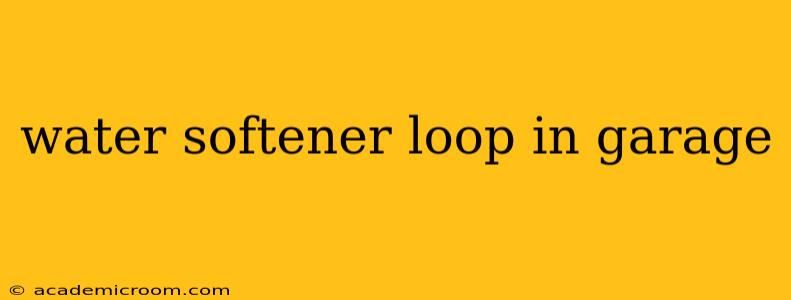Installing a water softener loop in your garage offers several advantages, from protecting your valuable tools and equipment to extending the lifespan of your appliances. However, it's crucial to understand the process and potential challenges before embarking on this project. This comprehensive guide will address common questions and concerns surrounding garage water softener loops, ensuring you have all the information needed for a successful installation.
Why Install a Water Softener Loop in the Garage?
Hard water wreaks havoc on more than just your kitchen and bathroom fixtures. In the garage, the effects can be equally damaging. Hard water can leave spots on your car, clog your pressure washer, and even corrode your tools over time. A dedicated water softener loop in your garage provides a consistent supply of soft water, mitigating these problems and protecting your investments. This is particularly beneficial for those who use their garage for serious hobbies like woodworking, auto detailing, or home brewing, where water quality is paramount.
What are the Benefits of a Garage Water Softener Loop?
- Protects Tools and Equipment: Soft water prevents mineral buildup on tools, keeping them clean, functioning optimally, and extending their lifespan.
- Improved Car Washing Results: Soft water produces a spot-free shine, making your car washing efforts significantly more effective.
- Enhanced Pressure Washer Performance: Prevents mineral buildup in your pressure washer, increasing its efficiency and longevity.
- Ideal for Hobbies: Provides the ideal water quality for activities like woodworking (prevents mineral deposits on finished pieces), brewing (improves taste and clarity), and more.
- Convenience: Dedicated soft water line eliminates the need to run long hoses from the main water softener.
How Does a Garage Water Softener Loop Work?
A garage water softener loop typically involves running a separate line from your main water softener to a designated faucet or spigot in your garage. This line delivers softened water directly to the area where it's needed, avoiding the hard water supply. This often involves running a new plumbing line from the main water softener location to the garage. The exact installation will depend on your home's plumbing layout and the location of your existing water softener.
What are the Costs Associated with Installing a Garage Water Softener Loop?
Costs vary greatly depending on several factors, including the distance between your water softener and the garage, the complexity of the plumbing required, and whether you hire a professional plumber or tackle the project yourself. Expect costs to range from a few hundred dollars for a simple installation to several thousand dollars for more complex projects involving extensive plumbing work. Material costs include piping, fittings, valves, and potentially a dedicated faucet or spigot. Labor costs will be significant if you hire a professional.
Can I Install a Garage Water Softener Loop Myself?
While some DIY enthusiasts might attempt this project, it's generally recommended to hire a qualified plumber. Plumbing incorrectly can lead to leaks, water damage, and even safety hazards. A professional plumber will ensure proper installation, connection to your existing system, and compliance with local building codes. If you're comfortable with plumbing, consult detailed diagrams and videos before starting the project.
What Type of Piping is Recommended for a Garage Water Softener Loop?
Commonly used piping materials for this application include CPVC (chlorinated polyvinyl chloride) or PEX (cross-linked polyethylene). Both are durable, relatively inexpensive, and easy to work with. The choice between them might depend on your preference, local code requirements, and the existing plumbing in your home.
What about Maintaining the Garage Water Softener Loop?
Maintaining the loop is essentially the same as maintaining your main water softener. This includes regularly checking the salt levels in the softener tank, ensuring proper regeneration cycles, and periodically flushing the system to remove any accumulated sediment. Since it is a separate loop, problems within this loop won't affect your primary water supply.
This guide provides a comprehensive overview of installing a water softener loop in your garage. Remember to prioritize safety and consider hiring a professional plumber for a trouble-free installation. By taking the necessary steps, you can enjoy the many benefits of consistently soft water in your garage.
